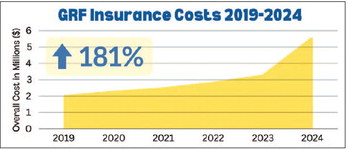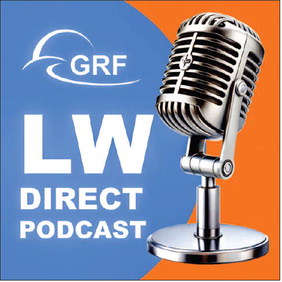New Finance Committee discusses insurance costs


COMMITTEE RECAP
by Ruth Osborn
Communications Director
The Golden Rain Foundation Finance Committee held its inaugural meeting on Aug. 15. The GRF Board voted last month to add a fifth committee to the roster, in addition to the Administration, Facilities, Member Services and Operations committees. Most GRF Board business originates at one of these committees.
The Finance Committee heard a report on the impending 2025 budget, which is now being drafted in every GRF department, according to Executive Manager of Mutual Services Dave Potter. New this year is an effort to get the budget completed and approved by October. Historically, the budget has been done in September, but the GRF Board delayed the schedule to get a more accurate forecast on insurance costs since those are such a big driver for the budget.
The final insurance cost will still come in after the budget is finalized, but hopefully, the shift will put GRF in a better position to forecast the potential impact for itself and the Mutuals.
In year’s past, insurance projections could be reliably calculated based on past claims data and potential community risks. But no more, as insurance companies grapple with catastrophic pay-outs related to fires and other natural disasters. Last year, GRF renewals exceeded projections by more than $1 million. Sticker shock was felt here with rising assessments and across the state, and reverberations continuing. For example, in one California community, the fire insurance premium increased by almost 900%, and some insurance companies pulled out of California altogether, citing years of sky-high pay-outs related to natural disasters.
The bad news is that next year’s renewals are expected to exceed 2024 costs. But for now, with the year halfway gone, the GRF budget remains in the black, Potter said.
“GRF is finishing the second quarter with a year-to-date surplus of $169,840.68, down slightly from the first quarter, which had an ending surplus of $196,681.18,” he said, adding that the positive trend will not continue given high insurance costs.
Revenue for 2024 is ahead of budget by $1,109,278.85. Expenses are over budget by $939,438.17, and most of the overage in expenses—$620,405.52—is in the insurance line item. “Without the insurance coverage, expenses would be over budget by $319,032.65 through six months,” Potter said. But overall, the budget would be in the black, and probably finish the year in the black, if it weren’t for the insurance being over budget.
It is most likely that the surplus position will flip to a deficit in the next month or two. There is potential for a small recovery against this anticipated deficit during October and November, but December will push the GRF’s financial position into negative territory when the down payment on the insurance renewal must be paid, Potter said.
Regarding GRF’s cash position, the contingency fund was at about $350,000 at the end of June. The insurance down payment in December, anticipated to be more than $1 million, will be taken from this fund. It is unlikely that there will be enough money to cover it, which will necessitate funneling money from the capital fund to make the required payment.
The bottom line: the GRF continues to perform well against its budget for the 2024 fiscal year, despite the strong headwinds that will continue through the rest of the year.
The GRF budget will be presented to the GRF Board in October.
GRF's insurance costs have increased from $1.98 million in 2019 to $5.57 million in 2024.
Emma DiMaggio



